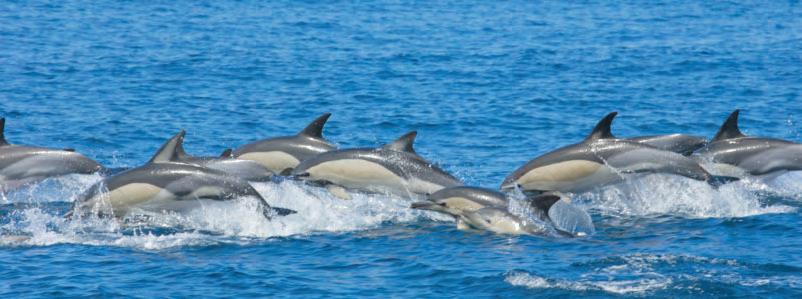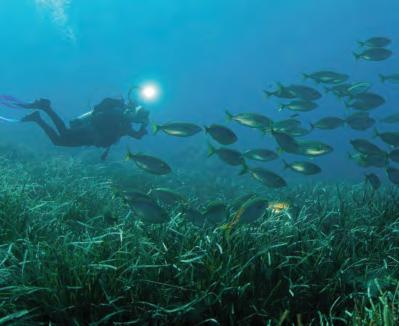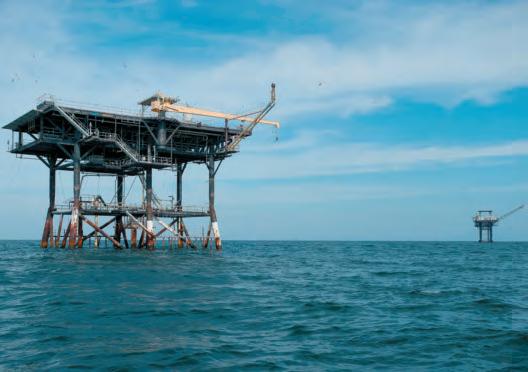
17 minute read
Victories
Oceana works on a limited number of campaigns with clear short-term objectives designed to bring our oceans back to vitality. In 2010, we won many important victories for the ocean.
EndIng dIRTy And dAngEROuS OffShORE dRIllIng
2010 was a roller-coaster year for opponents of offshore drilling. In March, the Obama administration announced its intention to allow offshore drilling in the Atlantic from Delaware to Florida and expressed interest in opening areas of the southeast Gulf Coast and the Alaskan Arctic.
Just weeks later, in April, the Deepwater Horizon rig in the Gulf of Mexico experienced a massive blowout that resulted in an explosion that killed 11 workers and sank the rig, triggering a seafloor gusher that pumped an estimated 171 million gallons of crude oil into the Gulf of Mexico.
VICTORy: getting the u.S. Offshore drilling Ban Reinstated
Eight months after the devastating oil spill in the Gulf of Mexico, the Obama administration announced that in its new five-year drilling plan, no new offshore drilling would be allowed in the eastern Gulf of Mexico or off the Atlantic and Pacific coasts in a reversal of its March announcement to open American coasts to drilling. The government also announced the start of a new process to reconsider drilling in the Arctic’s Beaufort Sea.

© OCEANA | Carlos Suárez
Oceana was at the forefront of opposition to offshore drilling and played a key role in making this decision possible. Our campaign team used advertising, enormous amounts of press and broad grassroots support to bring about the change we needed to the government’s offshore drilling policy. More than 100,000 people signed Oceana’s petition to “Stop the Drill,” noting that the Deepwater Horizon disaster showed that offshore drilling could never be safe or clean.
© NOAA
PREVEnTInG sEAFOOd COnTAMInATIOn
When Oceana began its campaign to end seafood contamination in 2005, nine chlorine factories in the United States used outdated technology that resulted in mercury pollution entering the atmosphere and waterways, eventually finding its way into popular seafood species like tuna and swordfish. Today, only two factories remain, as Oceana has convinced seven of the nine mercury-polluting factories to eliminate mercury use.
Seafood contamination is a significant problem for the nearly one billion people around the world who depend on seafood as a primary source of protein. The presence of mercury is especially dangerous for small children and women of childbearing age. The U.S. Food and Drug Administration (FDA) has advised these groups to eat no more than six ounces of albacore tuna or tuna steaks per week because of mercury and to completely avoid eating swordfish, shark, tilefish and mackerel.
Oceana’s campaign to prevent seafood contamination is twofold: to end needless mercury pollution from outdated chlorine plants, and to convince major grocery stores in the United States to post the FDA advisory on mercury in seafood.
VICTORY: Olin Corporation Ends Mercury Use
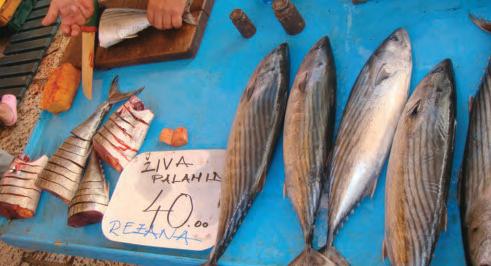
Following years of campaigning by Oceana, the Olin Corporation agreed to stop mercury use at both of its mercurybased chlor-alkali manufacturing plants. In Charleston, Tenn., Olin will convert its chlorine production to modern, mercuryfree technology and it will end chlorine production altogether from its plant operation in Augusta, Ga.
Olin’s plant in Tennessee was the largest remaining mercury-based chlorine plant of the four plants in the U.S. that had refused to make the switch to safer, more efficient technology. The company plans to switch by 2012, showing that even a large facility can shift to mercury-free technology in the timeframe described in proposed legislation that is supported by Oceana. The legislation would require plants to end mercury use by 2015.
When Oceana began its campaign, nine chlor-alkali plants polluted the environment with mercury. Five have since shut down or converted to mercury-free technology.
© OCEANA | LX
PROMOTInG REsPOnsIBLE FIsHInG
“We are fighting a war against fish, and we are winning,” says scientist and Oceana board member Dr. Daniel Pauly in the acclaimed documentary, “The End of the Line.” Our oceans are under incredible pressure from the fishing industry. Ninety percent of the big fish – sharks, tuna, swordfish – are already gone. Destructive fishing practices like bottom trawling waste an estimated 16 billion pounds of fish and kill countless marine mammals every year, while obliterating ocean habitat like coral reefs and seamounts that can take decades or centuries to recover.
Oceana works to protect critical habitats and end the use of wasteful fishing gear to ensure that healthy, abundant oceans can thrive.
VICTORY: Protecting Belize from Foreign Fleets
Belize is home to a portion of the world’s second largest reef system and a thriving local fishing community. Many Belizean fishermen still use age-old methods to catch lobster, shellfish and reef fish from their canoes, supporting a thriving local fish market.
The sustainable Belizean way of supplying fish to the community was threatened when Jamaican commercial fishing boats, equipped with more sophisticated technology, appeared unannounced in Belize’s waters. Oceana discovered that other, even more powerful fishing nations were also planning to start fishing in Belize.
Oceana called on the government of Belize to stop issuing fishing licenses to foreign fishing fleets in the country’s waters until it could consult with local fishermen and conservationists. The Ministry of Fisheries agreed, keeping Belize’s local, sustainable fishing community intact.

In 2010, Oceana made great progress toward the goal of eliminating illegal driftnets, also known as “floating walls of death,” from the Mediterranean Sea by 2013.
In June, Italian fishermen from the port of Bagnara Calabra surrendered part of their illegal nets after a nearly year-long blockade of the port by the Italian Coast Guard. In August, Morocco passed an amendment banning the use, possession, manufacture or sale of driftnets starting in 2011. With 300 vessels using driftnets, Morocco has been one of the most notorious users of the wasteful gear in the Mediterranean. A month later, Turkey followed suit, announcing it would stop using the destructive fishing gear in 2011.
Driftnets have been banned by both the United Nations and the European Union for years, but many vessels have continued using them. Thousands of marine creatures, including whales, dolphins, sharks and sea turtles are trapped and killed by this indiscriminate fishing gear each year. Oceana’s campaigners have continued to work to ensure that the ban is enforced.
© OCEANA
VICTORY: Quota for Chile’s Most Important Fishery Reduced in Chile
After an investigation by Oceana revealed that the Chilean government was ignoring its own scientists’ recommendations and setting unsustainable quotas, the Chilean government announced a drastic reduction in the fishing quota for jack mackerel starting in 2011.
Jack mackerel is the most important commercial seafood fishery in Chile and a main source of fish meal and oil for Chile’s large salmon industry.
The decision came after Oceana sent the Minister of Economy a report analyzing the annual quota for jack mackerel during the past 10 years. The study, using data that Oceana obtained through Chile’s Freedom of Information Act, shows that between 2003 and 2010 the National Fisheries Council set the annual quota for jack mackerel at much higher catch limits than were recommended by the Institute for Fisheries Development. For example, in 2009 the quota was 87 percent higher than recommended by the agency.
VICTORY: Bluefin Tuna season Cut short
After continuous campaign work by Oceana and following quota reductions for bluefin tuna, one of the ocean’s iconic fish species, the European Commission closed the bluefin tuna purse seine fishery early for the third year in a row in June, an important measure to help this threatened species.
Bluefin tuna stocks are on the verge of collapse due to overfishing and illegal fishing. The population of these incredibly fast moving, warm-blooded top predators has decreased by 80 percent from levels before the industrial fishing era thanks to an enormous global appetite for the fatty belly meat of the bluefin, which makes high-grade sushi.
A basking shark caught by a Spanish trawler.

© OCEANA | María José
VICTORY: Preventing Overfishing in the Pacific and Alaska
Building on the precedent set by a ban on krill fishing in 2009, Oceana made strides in protecting important prey species in the Pacific.
As a result of Oceana’s work, the government set a low catch limit for shortbelly rockfish, an important prey species for seabirds, marine mammals and Chinook salmon. In addition, the government included Pacific herring and jack smelt in fishery management plans in order to ensure that commercial fisheries do not affect populations of these important prey fish.
In Alaska, the government increased responsible management for sharks, skates, sculpins and octopus in the Bering Sea and the Gulf of Alaska where none existed before. In addition, Oceana convinced the government to maintain a prohibition on the commercial harvest of forage fish in these areas.
VICTORY: Chile Reforms salmon Industry

In March, the Chilean Congress passed groundbreaking legislation to prevent the escape of farmed salmon and further regulate the use of antibiotics in salmon aquaculture. The legislation is a direct result of Oceana’s two years of campaign work to address the environmental impacts of salmon farming.
The reform criminalizes farmed salmon escapes, imposing hefty fines as well as prison sentences for violators. Upwards of 10 million salmon are estimated to escape each year, and they can travel great distances and threaten the health of native fish populations by competing for food and transmitting parasites and diseases.
In addition, the reform also bans the preventive use of antibiotics and requires companies to make public the amounts and types of antibiotics they use.
Combating Overfishing on a Global scale
The World Trade Organization (WTO) is the 153-country organization responsible for setting and enforcing the rules of international trade. With one decision to end fishing subsidies that drive overfishing, the WTO could become an unlikely savior for the oceans. Oceana has worked for several years to end harmful subsidies, which support a global fishing fleet an estimated 2.5 times the size needed to fish the oceans sustainably. In 2010, Oceana continued to work toward the advancement of a strong and effective fisheries subsidies agreement.
In May, Oceana initiated and organized a sign-on letter about fisheries subsidies to G-20 nations from prominent conservationists and scientists, including Sylvia Earle, Leonardo DiCaprio, Glenn Close, Celine Cousteau and Daniel Pauly as part of the Mission Blue Voyage.
In July, Oceana board member and actor Ted Danson testified before the Trade Subcommittee of the U.S. Senate on government subsidies and their negative impact on the oceans and global seafood market.
In September, Oceana sponsored a panel discussion at the WTO Public Forum, which included leading international fisheries scientists and trade experts, and was moderated by Peter Allgeier, former U.S. Ambassador to the WTO.
Throughout the year, Oceana also brought leading experts, including fisheries economists, scientists and its board of directors to Geneva to meet WTO diplomats.
World Trade Organization Director-General Pascal Lamy, center, met with members of Oceana’s board of directors and executive committee. © OCEANA | Miguel Bueno
hABITAT PROTECTIOn
Oceans cover 71 percent of the planet, and yet scientists know more about the surface of Mars than the ocean floor. What we do know is that oceans are home to some of the world’s most vibrant ecosystems, from coastal upwellings that host a cornucopia of wildlife to centuries-old white coral forests a mile below the surface.
Oceana works for preventive measures that protect these ecosystems before they are exploited by industrial fishing or ruined by pollution. These efforts have resulted in nearly a billion acres of sea protected from trawling and industrial fishing, an area one-and-a-half times the size of Alaska, California and Texas combined. In 2010, Oceana expanded its efforts to secure unprecedented protections for marine ecosystems.
VICTORy: Belize Bans All Trawling
In December, Belize became one of the few countries in the world to ban all forms of trawling, one of the most destructive fishing methods in the world.
The historic decision protects Belize’s section of the Mesoamerican Reef, the largest coral reef system in the western hemisphere and a UNESCO World Heritage Site. In addition to its ecological importance, the Mesoamerican Reef has incalculable value to Belize’s tourism industry and culture. Home to some of the Atlantic Ocean’s only atolls, it is one of the most popular diving sites in the world.
Led by Oceana’s vice president for Belize, Audrey MaturaShepherd, Oceana worked with Prime Minister Dean Barrow, Minister responsible for Fishers Rene Montero and the Northern Fishermen Cooperative to protect the reef, its marine inhabitants and its value to Belize’s heritage.
VICTORy: Chile Creates World’s fourth largest no-Take Marine Reserve
Chile’s President Sebastián Piñera announced the creation of the world’s fourth largest no-take marine reserve of 150,000 square kilometers around Sala y Gómez Island, an uninhabited island near Easter Island that may be one of the last pristine vulnerable marine ecosystems in the Pacific.
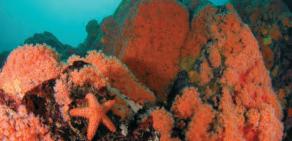
The decision was spurred by Oceana, National Geographic and the Waitt Foundation’s expedition to Sala y Gómez. The expedition team photographed and filmed abundant populations of vulnerable species such as sharks and lobsters and found unexpectedly high biodiversity in deeper waters. The national press coverage of the expedition convinced lawmakers of the need to protect Sala y Gómez.
The no-take marine reserve includes the highest level of ocean protection, meaning that no fishing will be allowed within the park. The decision expands Chile’s total marine protected area more than 100 times, from 0.03 percent to 4.41 percent.
VICTORy: historic Environmental Victory in Chile – defeat of Coal-fired Power Plant, Birth of a new Environmental Movement
Two days after a regional Chilean authority approved the construction of a coal-fired power plant near ecologically sensitive Punta de Choros, Chilean President Sebastián Piñera responded dramatically to the immense nationwide grassroots opposition led by Oceana and its allies – including thousands of peaceful protestors in the streets – by requesting that Suez Energy relocate the plant. In addition, the President directed his cabinet to review all the industrial projects being considered in the country to see whether they could affect protected areas.
The thermoelectric plant would have been constructed at close proximity to two marine reserves, which include nesting habitat for 80 percent of the world’s endangered Humboldt penguins. Hot water emissions from the plant would have threatened Chilean abalone, a critical fishery, and the plant would have dumped immense amounts of toxic anti-fouling chemicals into the ocean every day.
The salvation of Punta de Choros was a watershed moment in the Chilean conservation movement. The victory was covered on the front pages of all of Chile’s national newspapers and was the lead story on most of the national news programs. It was such big news and Oceana’s role so important, that after the victorious outcome, Alex Muñoz, Oceana’s vice president for Chile, was the first NGO representative ever invited on “Tolerancia Cero,” a national interview program similar to the U.S.’s “Meet the Press,” which had previously only invited the country’s political and business leaders.
© OCEANA | Eduardo Sorensen Diverse corals flourish in the Punta de Choros region in Chile.
VICTORy: Creating Marine Reserves in Oregon’s Pacific Waters
Regulations for the first two marine reserves in Oregon State waters were finalized by the three state agencies in January 2010. Oceana ensured that these significant protections moved forward and were based on sound science. The management measures will go into place in July 2011. Additionally, three Oregon coastal community teams, the Oregon Department of Fish and Wildlife and the Ocean Policy Advisory Council all voted to recommend additional marine reserves and protected areas off the Oregon coast.
PROTECTInG MARInE WILdLIFE
The oceans are home to an incredible array of wildlife, from the largest animal in history, the blue whale, to the tiny krill that the blue whale eats. Ocean creatures also undertake incredible migrations, like the Pacific leatherback sea turtle, which travels 12,000 miles from breeding to feeding grounds. At each stage of life, marine wildlife faces threats from fishing gear, habitat loss and climate change. Oceana works to make the ocean a safe place for wildlife.
VICTORY: saving steller sea Lions in the Aleutian Islands
After a four-year delay by the U.S. government, Oceana’s advocacy led to the release of a long-awaited National Marine Fisheries Service report finding that Steller sea lions, which are apex predators, are in jeopardy in Alaska due to the overfishing of their prey.
The population of sea lions continues to decline in the far western Aleutian Islands and has not recovered in other areas. Scientists have said that the population’s continued low birth rate likely is caused by a lack of food. As a result, the government reduced catches of Atka mackerel and Pacific cod, important food sources for the sea lions, and closed fishing in some important foraging habitat where sea lion declines have been the most severe.
VICTORY: Congress Ends shark Finning in U.s. Waters
After years of pressure from Oceana, the U.S. Congress passed the Shark Conservation Act, which ends the brutal practice of shark finning in U.S. waters. The law improves the existing legislation originally intended to prevent shark finning and allows the U.S. to take action against countries whose shark protections are weak, cementing the U.S. as a continued leader in shark conservation. Shark finning is the act of slicing off a shark’s fins and then tossing the shark, often still alive, back in the water to suffocate or bleed to death. The fins are used in shark fin soup, a popular Asian delicacy. Many shark populations have declined to levels where they are unable to perform their roles as top predators in the ecosystem. Up to 78 million sharks are killed each year for their fins.
VICTORY: 70,000 square Miles of Protection for Pacific Leatherbacks
In January, in response to a petition submitted by Oceana and allies, the U.S. government issued a proposed rule to designate more than 70,000 square miles of critical habitat for endangered Pacific leatherback sea turtles in the waters off California, Oregon and Washington. The protections are the first critical habitat designation for sea turtles in ocean waters off the continental United States.
Every summer and fall, Pacific leatherbacks migrate from their nesting grounds in Indonesia to the ocean waters off the U.S. West Coast to feed on jellyfish. This 12,000mile journey is the farthest known migration of any living reptile. During the journey, leatherbacks face many threats, including capture in commercial fishing gear, ingestion of plastics, poaching, global warming and ocean acidification. Protection of their foraging habitats and migratory corridors is essential to their recovery.
VICTORY: Establishing International Conservation Protection for sharks and sea Turtles
In 2010 the International Commission for the Conservation of Atlantic Tunas (ICCAT) passed new protections for sharks and sea turtles in international waters.

Specifically, the group established conservation measures for oceanic whitetip sharks, hammerhead sharks and shortfin mako sharks. In addition, ICCAT put in place new measures to reduce sea turtle mortality, such as the use of sea turtle dehooking and disentangling gear, as well as mandatory collection and submission of sea turtle bycatch data. Up to 350,000 sea turtles are accidentally caught by longline fisheries in the Atlantic Ocean and Mediterranean Sea every year.
The decision came after years of work by Oceana in ICCAT member countries and in ICCAT. Oceana presented a report estimating that more than 1.3 million highly migratory sharks were caught in the Atlantic Ocean in 2008 without any international fisheries management. The report also showed that of the 21 highly migratory shark species reported caught in ICCAT waters, three-quarters are classified as threatened with extinction in parts of the Atlantic Ocean, according to the International Union for Conservation of Nature.
VICTORY: Europe Guards Thresher and Hammerhead sharks
In a groundbreaking move proposed by the European Commission, the Indian Ocean Tuna Commission became the first regional organization to protect three species of thresher sharks. Thresher sharks are remarkable animals with caudal fins that can be as long as their bodies, which they use to stun prey. The European Commission is advocating a complete ban in the European Union on catching and killing thresher and hammerhead sharks.
The decision came after extensive lobbying and press centered around the release of Oceana’s report “The Race for Threatened Sharks,” which underscores the need for shark conservation.
© OCEANA | Jesús Renedo
